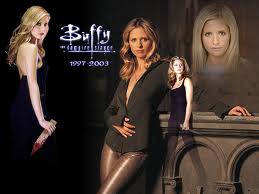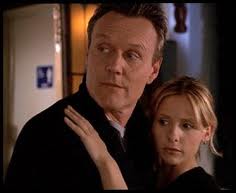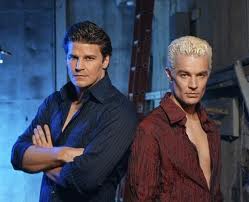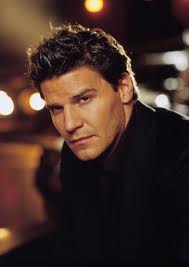What Buffy the Vampire Slayer Taught Me
Welcome to Deep-Fried Friday. Today, our deep-fried food is served with a blood cocktail, to honor the vampires and other paranormal creatures of Buffy the Vampire Slayer. Some of my friends know that I’ve been watching through the entire Buffy series on Netflix. (All seasons are available through streaming episodes.)

I missed this TV show when it was on from 1997 to 2003. Why? Those were the years of early parenthood for me, so my television set was tuned in to shows like Yes, Dear and Blue’s Clues instead. I finally decided to figure out what all the hype was about and started watching the series a few months ago.
As I watched all seven seasons, I made a few interesting observations which apply to TV and other sources of fiction (books, movies, etc.). Other than the obvious conclusions that karate moves are still cool and fighting evil doesn’t preclude dressing fashionably, here’s what Buffy the Vampire Slayer taught or reminded me.
Genre is just the setting; the story is about the characters. Is Buffy the Vampire Slayer about vampires or Buffy? Well, yes. But the vampires, demons, prophecies, ninja fighting, etc. are all background to simply tell the story of teenagers growing into adulthood.

Ditto for Harry Potter. The Twilight series is about lovers couched in vampire/werewolf legends. Mysteries are about the sleuth solving the case. Horror is about someone we’re rooting for making it out alive. Fantasy is about the journey of a questor. And so on and so on.
While I believe that world-building and plots are important, ultimately who cares how clever you are with that unless there is some underlying struggle for a character we can relate to or root for. We cheer for Buffy to kill the bad demons because she embodies struggles we face — such as wanting to be special versus wanting to be normal; needing to stand up to bullies and wanting to take a backseat; dealing with the complications of relationships; and moving from protection by parents and mentors to making our own way in the world. The reason Buffy resonates is because we all have our demons to fight; we understand why her story matters.

Sometimes your favorite character isn’t the protagonist. Buffy Summers is the main character, and the series is about her. Thus, the name: Buffy the Vampire Slayer. Yet often the protagonist is a person in constant conflict who needs a little support or humor from others around her. Buffy’s closest friends, Willow and Xander, provide that — Willow with compassionate support and Xander with humorous quips. There are plenty of other famous sidekicks in fiction. These characters have their own appeal.
As the series progressed, my favorite character became Anya, an ex-vengeance demon, who ends up working with Buffy’s mentor Giles at his magic shop, having a romantic relationship with Xander, and fighting alongside the good guys even when her motivation is a bit unclear. Why do I love her? She says exactly what she thinks. I love such characters in fiction — the ones who speak with no filter whatsoever, who say what we wish we could say but have too much restraint to, and whose charm lies in their optimism that truth is always best.
If you start a fantastical story, you have to get really inventive to keep it going. I noted to my husband that Buffy and Chuck share this in common: Since they begin with such a far-fetched premise (hellmouth under your town and teenage vampire slayer; all-knowing Intersect stuck in Chuck’s brain and spies to protect him), where do you go from there? You have to keep coming up with bigger and better stories, several of which can get a little, well, unbelievable.
Yes, we’re already in the territory of unbelievable, but sometimes it reached, “Ah, c’mon!” I think this is one of the reasons why long fiction series don’t often work well. The author must either regurgitate plot lines dressed up in other attire or get more and more out there in raising the stakes to keep the conflict and tension up. How far we’ll go with the writer likely depends on how much we like the characters and feel invested in their story.
 Romances do not always work the way we wish. Team Spike or Team Angel? I think that predated the perpetual Jacob vs. Edward argument. Maybe you’re even willing to go out on a limb and suggest Team Riley. I know exactly who I think Buffy should end up with, but others have their own ideas. And I doubt anyone was fully satisfied by the end of the series on the romance front.
Romances do not always work the way we wish. Team Spike or Team Angel? I think that predated the perpetual Jacob vs. Edward argument. Maybe you’re even willing to go out on a limb and suggest Team Riley. I know exactly who I think Buffy should end up with, but others have their own ideas. And I doubt anyone was fully satisfied by the end of the series on the romance front.
Interestingly enough, two of my beta readers on my mystery, Grace & Fire, were upset that the romantic portion of my novel didn’t go the way they wanted. I stick by my decision, and more readers than not agreed with me, but I can understand the disappointment of the couple you root for not getting together in that “ain’t it all great” happily ever after. I’m more willing than most to deal with such a proposition — given that among my favorite novels are such depressers as Anna Karenina and Madame Bovary — but it still irks me a little. Why can’t it all work out the way we envisioned in our pretty little heads? Maybe like life, sometimes it does and sometimes it doesn’t.
 David Boreanaz is my “type.” That has nothing to do with fiction. It’s just another take-away. Actually, the actor who played Angel, the vampire with a soul, reminds me a bit of my husband: Tall, dark-headed, broad-shouldered, hard to read, and not a big talker. My hubby does need fangs and a long black leather coat to complete the look. I understand that I can keep gazing at David Boreanz now that he’s in the Bones series. I’ll have to check that one out.
David Boreanaz is my “type.” That has nothing to do with fiction. It’s just another take-away. Actually, the actor who played Angel, the vampire with a soul, reminds me a bit of my husband: Tall, dark-headed, broad-shouldered, hard to read, and not a big talker. My hubby does need fangs and a long black leather coat to complete the look. I understand that I can keep gazing at David Boreanz now that he’s in the Bones series. I’ll have to check that one out.
So are you a Buffy the Vampire Slayer fan? Why did you like the series? Who was your favorite character? What are some of your favorite TV series and what were your take-aways?
Julie Glover
Julie Glover loves whimsy, wit, and what-ifs, but her stories also explore real-life experiences and deep-down emotions. She believes we're stronger than we think, laughter is a necessary survival skill, and you can never own too many pairs of boots.